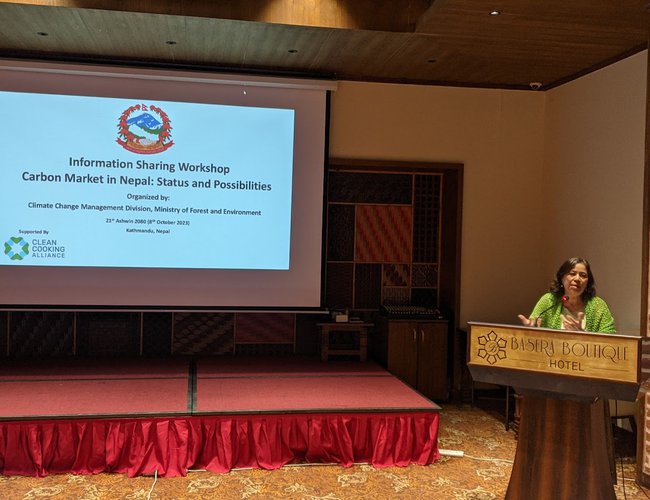
As the financial resources in the government’s coffers is shrunk in Western countries, NGOs and other civil society organizations working in countries like Nepal are facing crisis.
However, the Voluntary Carbon Market (VCM) offers significant opportunities to fulfill the gap in resources for NGO in Nepal.
Currently, Nepal’s NGOs/INGOs and private sector are facing difficulties in accessing the VCM due to a lack of rules. The recently concluded Information Sharing Workshop on Carbon Market in Nepal: Status and Possibilities was highly significant in addressing the issue.
Organized by the Climate Change Management Division of Ministry of Forest and Environment with support from the Clean Cooking Alliance (CCA), it was the first workshop held in Nepal to share information on VCM.
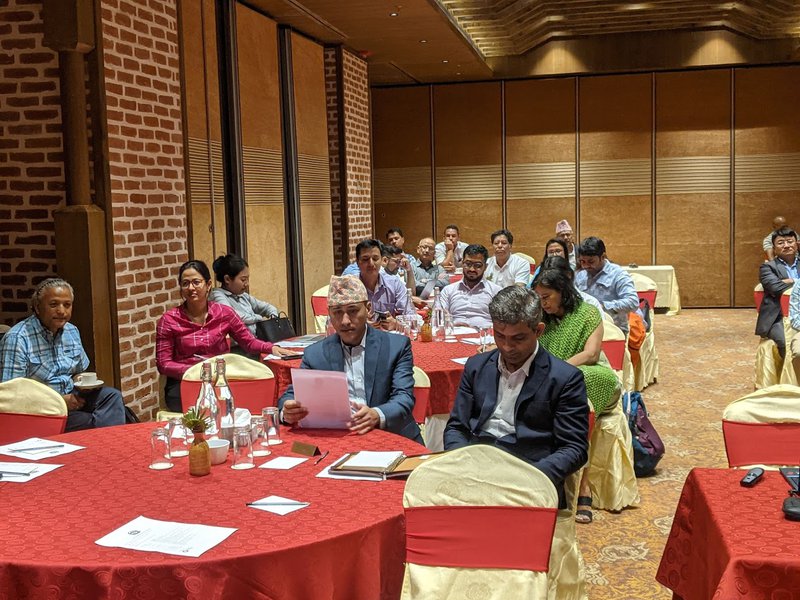
Despite endorsing the Paris Agreement and beginning the implementation of its Nationally Determined Commitment (NDC), Nepal, which previously couldn't benefit from carbon trading under the Kyoto Protocol, faces considerable challenges in establishing a presence in the carbon market.
As global efforts to achieve the Paris Agreement's goal of limiting global warming to 1.5°C above pre-industrial levels take shape, the VCM is gaining recognition as a valuable tool to advance this objective.
While the VCM hasn't traditionally played a prominent role in the fight against climate change, it has proven highly effective in financing projects worldwide that demonstrate innovative approaches to reducing Greenhouse Gas emissions and sequestering CO2 from the atmosphere.
According to the recent State of the VCM report by Ecosystem Marketplace, the VCM has channeled over £5 billion into various global projects, including renewable energy, clean cook stoves, and forest conservation.
Moreover, many of these projects have positively impacted on people's lives, and are in line with the United Nations' Sustainable Development Goals (SDGs). Given Nepal's status as the Least Developed Country with minimal emissions, it presents a significant opportunity to benefit from the Voluntary Carbon Market.
Despite ongoing uncertainty about the government's role and the status of the VCM in Nepal, the Climate Change Management Division of the Ministry of Forest and Environment (MoFA/CCMD) hosted an Information Sharing Workshop on the Status and Possibilities of the Carbon Market in Nepal on October 8th in Kathmandu.
The workshop was attended by senior government officials from the ministries of Energy, Water Resources and Irrigation, Agriculture and Livestock, and Kathmandu Metropolitan City, as well as academics, development partners, NGOs, INGOs, the private sector, and experts.
This half-day workshop received support from the Clean Cooking Alliance (CCA). Despite being the first workshop organized by the Ministry of Foreign Affairs (MoFA), a line ministry, participation was extensive, and discussions were intensive as stakeholders explored avenues to engage with the VCM.
The workshop aimed to improve relations between the government and stakeholder in Nepal's carbon market (VCM), share experiences and knowledge of regulation and certification, and evaluate Nepal's current VCM status. The focus was on objective evaluations, with technical terms explained upon their first use.
The effort successfully initiated a dialogue with various national and international organizations and stakeholders, facilitating engagement with the carbon market and an evaluation of current challenges and opportunities.
The CCA is committed to achieving the clean cooking target outlined in the Sustainable Development Goals and the Nationally Determined Commitment. They support the adaptation of electric cooking and strive towards zero emissions by 2045. Access to the VCM is a crucial part of this effort. In Nepal, despite endorsing the Paris Agreement and initiating the Verification and Certification Methodology under Article 6, the country has yet to realize the benefits of these agreements, even after seven years. The measures implemented by the MoFE in this regard are of great significance.
The workshop provided a comprehensive understanding of Article 6 of the Paris Agreement to key stakeholders. Even participants from the Voluntary Carbon Market (VCM) reported a significantly improved grasp of the subject. This was especially valuable for government officials who are currently in the process of issuing official recommendations (NOCs) to Nepalese parties seeking entry into the market.
One of the major outcomes of the workshop was a unanimous decision among participants not to classify the VCM as a government agency, recognizing its voluntary nature. For the first time, the government acknowledged its role in facilitating access to the market under Article 6. Additionally, participants expressed their belief that the VCM is closely linked to the Sustainable Development Goals (SDGs), and access to the VCM will be contingent on aligning goals with the SDGs.
Organized by the Climate Change Management Division of the Ministry of Forest and Environment and supported by: the Clean Cooking Alliance (CCA) the workshop aimed to prove information about the carbon market in Nepal: its current status and possibilities for the future. The workshop took place on October 8, 2023
The workshop featured three presentations on various themes: The first presentation title "Government Initiation in the Carbon Market" was delivered by Undersecretary of Climate Change Management Davison. The second presentation, title the Carbon Market in Nepal, was given by the Alternative Energy Promotion Center (AEPC). The third presentation title "Paris Agreement Article 6 was presented by Ugan Manandhar, Climate and Environment Advisor at FCDO.
Views from NGOs
International and non-governmental organizations (INGOs/NGOs) as well as private sector entities have shown a strong interest in participating in the Voluntary Carbon Market (VCM). However, they have faced difficulties in obtaining the necessary approvals from government authorities.
The lack of a well-defined regulatory framework has left some private organizations uncertain about how to proceed. Given the voluntary nature of the VCM, it is argued that the government's No Objection Certificate (NOC) mechanism should be sufficient Nevertheless; officials are considering a "soft regulation" approach before making recommendations.
Many members of the NGO and private sector communities have had negative experiences with strict regulations and argue that the VCM does not require heavy-handed oversight but rather facilitation from the government. Government representatives are suggesting the adoption of "soft regulations," while Ugan Manandhar, an expert on Paris Agreement Article 6, emphasizes that regulation is unnecessary due to the voluntary nature of the mechanism.
Despite Nepal's relatively small global emissions' contribution, it has significant potential in the carbon market. Ugan Manandhar highlighted that that the VCM, being voluntary, falls outside the scope of government regulations but still requires support.
Nepal's previous inability to benefit from the carbon market under the Kyoto Protocol was attributed to confusion related to policies. In contrast, India submitted 1400 projects, while Nepal only contributed 12, reflecting the impact of the regulatory framework.
The government's role should primarily involve facilitating the process, potentially by providing soft guidelines and coordinating with various networks. Some level of guidance is necessary to prevent unauthorized funds from entering the carbon trading market and to address issues related to money laundering. Similar to the tourism industry, the government can play a crucial role in ensuring effective coordination and communication within the carbon market.
Moderated by Shila Gyawali, Forest Officer of the Climate Change Management Division, Undersecretary Hari Sharma, who heads the Carbon Section of the Climate Change Management Division’s, initiated the workshop with opening remarks.
Sharma inquired about the pressing challenges faced by INGOs, NGOs, and the private sector at both domestic and international levels. He acknowledged the division's awareness of some NGOs and INGOs collaborating with municipalities in solid waste management to generate international financing through VCM. He also mentioned certain private entities operating in the agro-forestry and clean cooking sectors.
Furthermore, Sharma asked participants to identify the most significant obstacles they encounter regarding government policies, programs, and regulations. He also noted that parties at are risk particularly in dispute resolution due to a lack of transparency on the on stake holders. Lastly, Sharma encouraged participants to share their approaches to measurement, verification, and certification.
“Specifically, the Government is encouraging electric cooking, similar to the CCA initiative in Nepal, in households. They are also taking steps to increase the presence of electric and green vehicles in the transportation sector. The forestry and agriculture sectors are also significant areas of focus in this endeavor. Sharma clarified that the government's role is not that of a regulatory body but rather a facilitator, emphasizing "soft regulation," said Sharma
Pratima K.C, a Senior Officer at the Alternative Energy Promotion Centre (AEPC), presented a paper on the Nepalese carbon market. Throughout her presentation, K.C. maintained a formal tone, employed precise technical terminology, and refrained from biased language. She provided an impartial overview of the AEPC's past work on Verified Carbon Mechanisms (VCMs) and their current initiatives.
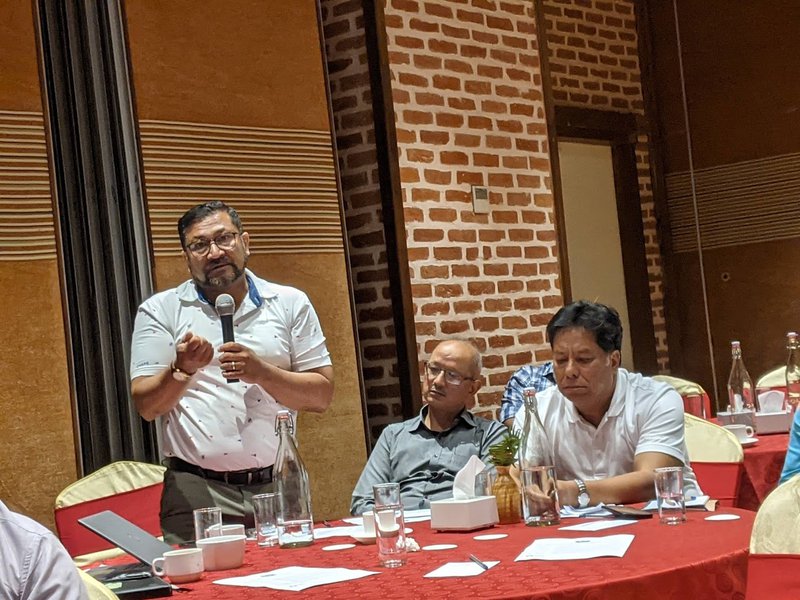
K.C. underscored the importance of clean cooking methods, such as bio-gas and electric cooking, as crucial steps toward a sustainable future. She also shared the AEPC's experiences with carbon marketing. K.C. explained that there are two types of markets: the regulatory compliance market and the voluntary compliance market.
Ugan Manandhar, an Advisor on Climate and Environment at the FCDO, discussed the significance of Article 6 of the Paris Agreement in the context of Voluntary Carbon Markets (VCM). According to him, emission reductions authorized for transfer under Article 6 by the selling country's government may be sold to another country, but only one country can count the reduction toward its NDC. To prevent double counting and overestimating global emission reductions, caution is essential.
Manandhar emphasized that carbon markets are a crucial tool in achieving global climate objectives, especially in the short and medium term. They enable the mobilization of resources and cost reduction to facilitate the transition to a low-carbon economy and reach the goal of net zero emissions efficiently. Carbon markets incentivize climate action by allowing parties to trade carbon credits generated by reducing or removing greenhouse gases from the atmosphere, such as transitioning from fossil fuels to renewable energy or wildlife conservation efforts to enhance or maintain carbon stocks in ecosystems like forests.
“Article 6 recognizes the potential for nations to engage in voluntary cooperation to enhance their mitigation efforts and promote sustainable development. Specifically, Article 6.2 outlines opportunities for collaborative methods and the exchange of Internationally Transferred Mitigation Outcomes (ITMOs) among various stakeholders, including national governments and private enterprises, under bilateral agreements. “
Dr. Buddi Sagar Poudel, the head of the Climate Change Management Division, chaired the workshop and Hari Sharma, Under-Secretary of the Climate Change Management Division, welcomed the participants and explained the purpose of the event.
In his statement, Sharma highlighted the significance of the topic of the Carbon Market in Nepal, including its current status and potential for the program.
According to Sharma, Article 6 of the Paris Agreement allows countries to willingly collaborate with each other to achieve their NDC emission reduction goals.
“We have been discussing definition of the institution in the legal framework. There are two mechanisms: one is bilateral, and the other is market-based. Furthermore, there are two different mechanisms - market and non-market. In conclusion, I would like to say goodbye said Poudel in his statement on reducing carbon emissions in the transportation, energy, and industrial sectors through technological Innovation."
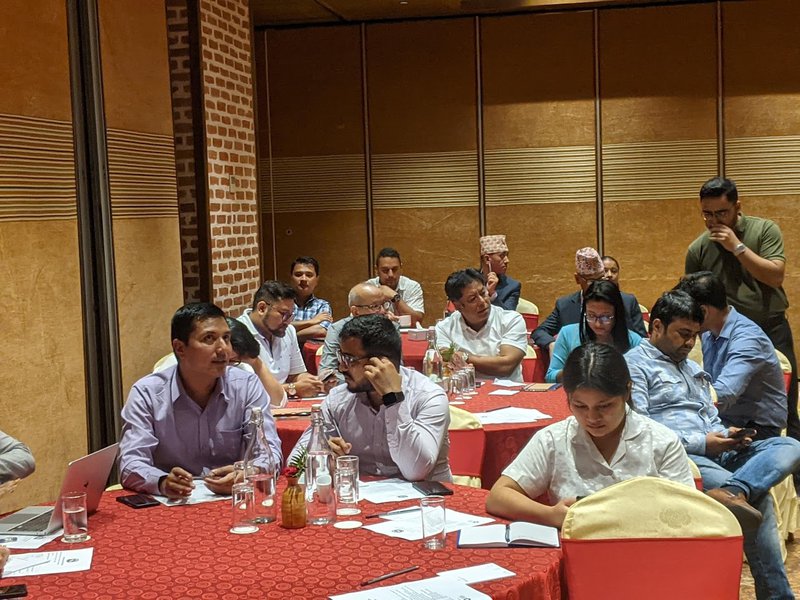
“Several Indian companies have come to Nepal in search of a partnership organization to access the carbon market. Unfortunately, due to the current circumstances and limited knowledge, Nepalese organizations face significant challenges in finding buyers for the voluntary market,” said Mohan Das Manandhar (SPI), a member of the recently constituted informal VCM Group.
“The lack of capacity and expertise is hindering their entry into the voluntary carbon market. Thus, we have decided to merge VEERA with the VCM group in a loose coalition. Our objective is to understand the world's foremost voluntary carbon market and its verification standards. Under the coordination of Purushottam Ghimire, we have formed an informal forum,” said Manandhar.
Min Bikram Malla represents Practical Action, an organization with a strong interest in the carbon market. Currently, there are 15,000 registered in VEERA and 5,000 in Gold Standard. Our organization has initiated a livelihood project and intends to register it with the Gold Standard. Both Livelihood and V&V are international companies. The V and V Livelihood Fund is a French company with a global presence and a commitment to reducing carbon emissions.
“We also work with biomass stoves and electric cooking, although electric cooking operates differently. Following a recent report in The Guardian, the credibility of bio-mass stoves has decreased, whereas electric cooking is seen as more reliable and robust. There is a high interest in electric cooking and government support could boost its market penetration. We are particularly interested in section 6.2 to determine participation opportunities for the private sector, NGOs, and INGOs. Furthermore, we have observed an increase in interest for section 6.4,” said Malla.
Subarna Kapali of Ajummery Bikas Foundation suggested that the government should initiate the process for VCM facilitation. Bhai Raja Maharjan, an expert on VCM, said that the VCM process required significant preparation.
Ram Sharan Timilisina, Deputy General Manager of Muktinath Krishi Company, shared his experiences of participating in the voluntary carbon market. Agriculture as a non-energy sector can also make a significant contribution to it. With support from German NGOs under climate financing, we carried out a smart agriculture project in Gandaki Province, implementing climate-smart food technology. The budget for this pilot project was $300,000.
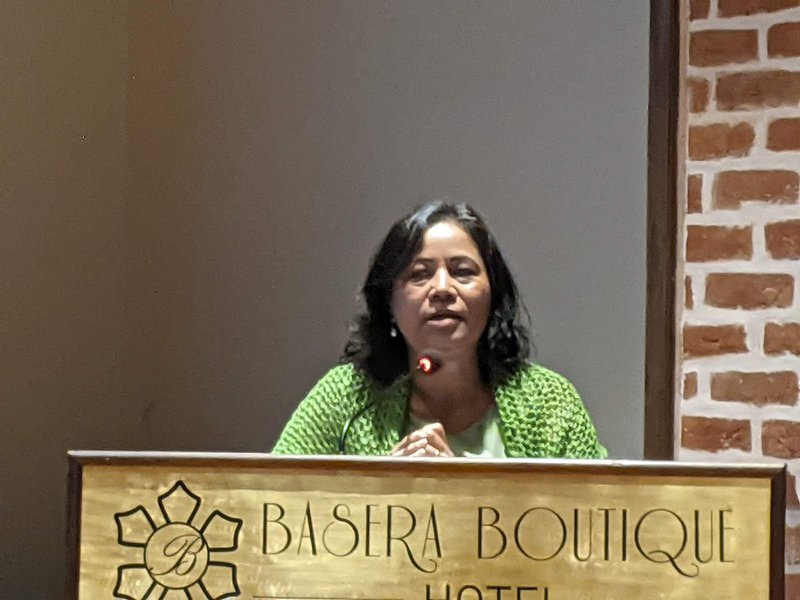
In her closing remarks, Karuna Bajracharya, the Country Manager of the Clean Cooking Alliance (CCA), emphasized CCA's active involvement in Nepal since 2017 and their extensive support for research projects such as Child Health.
She highlighted CCA's pioneering role in launching the first electric cooking demonstration project in Nepal, which showcased the viability of electric cooking in the country. Throughout the years, CCA has remained committed to implementing various programs aimed at helping Nepal achieve the government's NDC and SDG 7 targets.
Bajracharya also mentioned that CCA has collaborated with the National Planning Commission and the Alternative Energy Promotion Center to prepare a Clean Cooking Country Action Plan (CAP). This CAP is currently in the process of government endorsement and is expected to have a significant impact on reducing carbon emissions, which can be traded in the international carbon market.
Regarding climate financing, Bajracharya stated that CCA is currently implementing a project with support from climate, cooking, and pollution initiatives. She emphasized that the shift to electric cooking will substantially reduce carbon emissions and contributes to Nepal's journey toward achieving zero emissions and SDG 7 goals. In a time when NGO funding is decreasing globally, CCA has initiated a small program guided by the CAP, distributing electric cook stoves in the Madhesh province.
“These stoves come with a carbon calculation system, which will be used for fundraising for the project," said Bajracharaya. "The project is currently underway in select wards of Birgunj Metropolitan and several municipalities in Dahnusha."
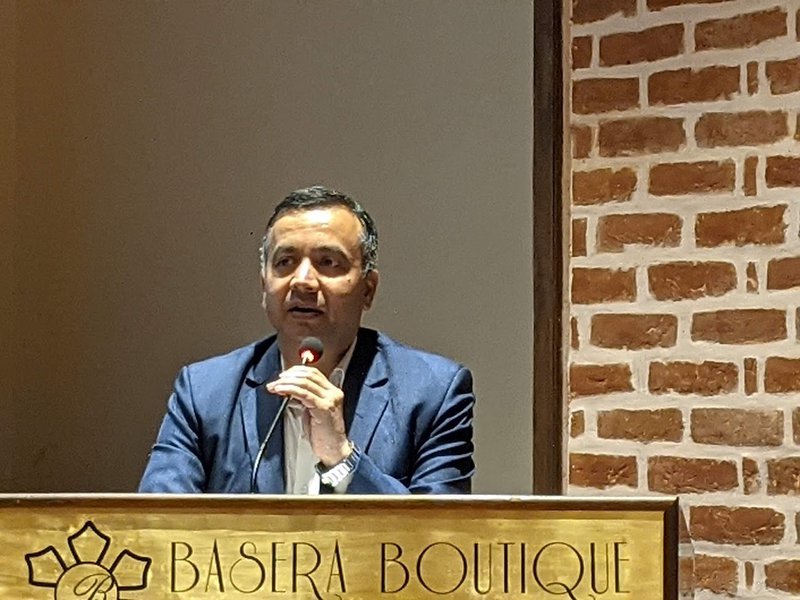
Dr. Nawaraj Dhakal, the Executive Director of the Alternative Energy Promotion Center (AEPC), also highlighted the projects supported by AEPC and the importance of VCM. He stressed that VCM doesn't require strict regulations, as the name itself suggests a voluntary market. He recognized the timeliness of the workshop, especially with the approaching COP, and the global importance of addressing emissions reduction.
One of the clear-cut messages of the workshop was that a need to have some sort of government mechanism to issue No Objection to those who are willing to enter VCM. The participants argued that since the nature of the market is voluntary, there should not be any regulations to regulate it.

Keshab Poudel
Poudel is the editor of New Spotlight Magazine.
- HELVETAS NEPAL’S RIVERBED FARMING: Shift From Overseas To Local Farming
- Jul 26, 2024
- POLITICAL SCENARIO : K.P. Sharma Oli's Resurgence
- Jul 21, 2024
- UNDP/MinErgy: An Inventive Approach To Clean Brick Kiln
- Jul 19, 2024
- HELVETAS NEPAL: Nutrition Through Riverbed Farming
- Jul 18, 2024
- NOU Opens To All: Dr. Shilu Manandhar Bajracharya, Vice Chancellor
- Jul 15, 2024
















